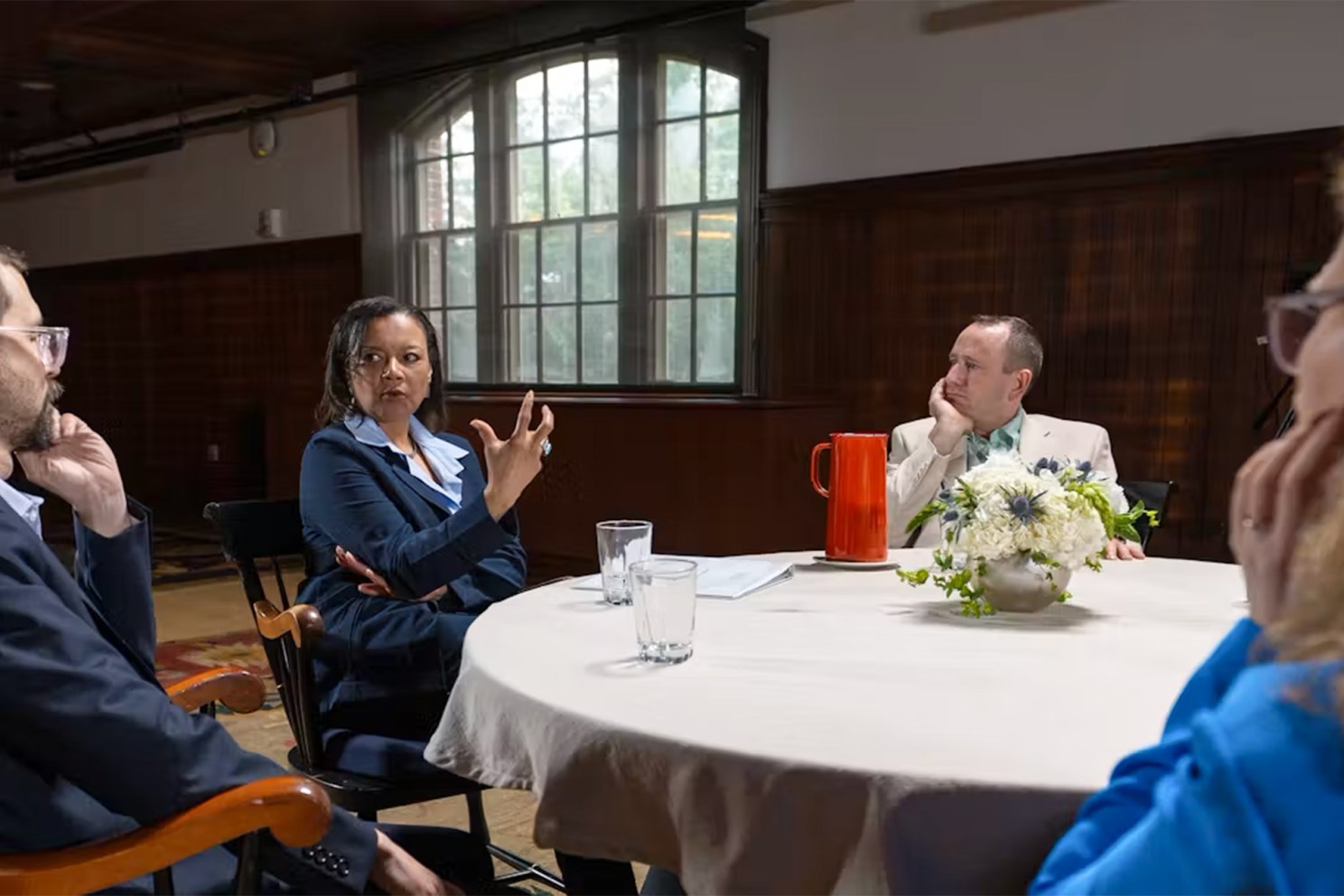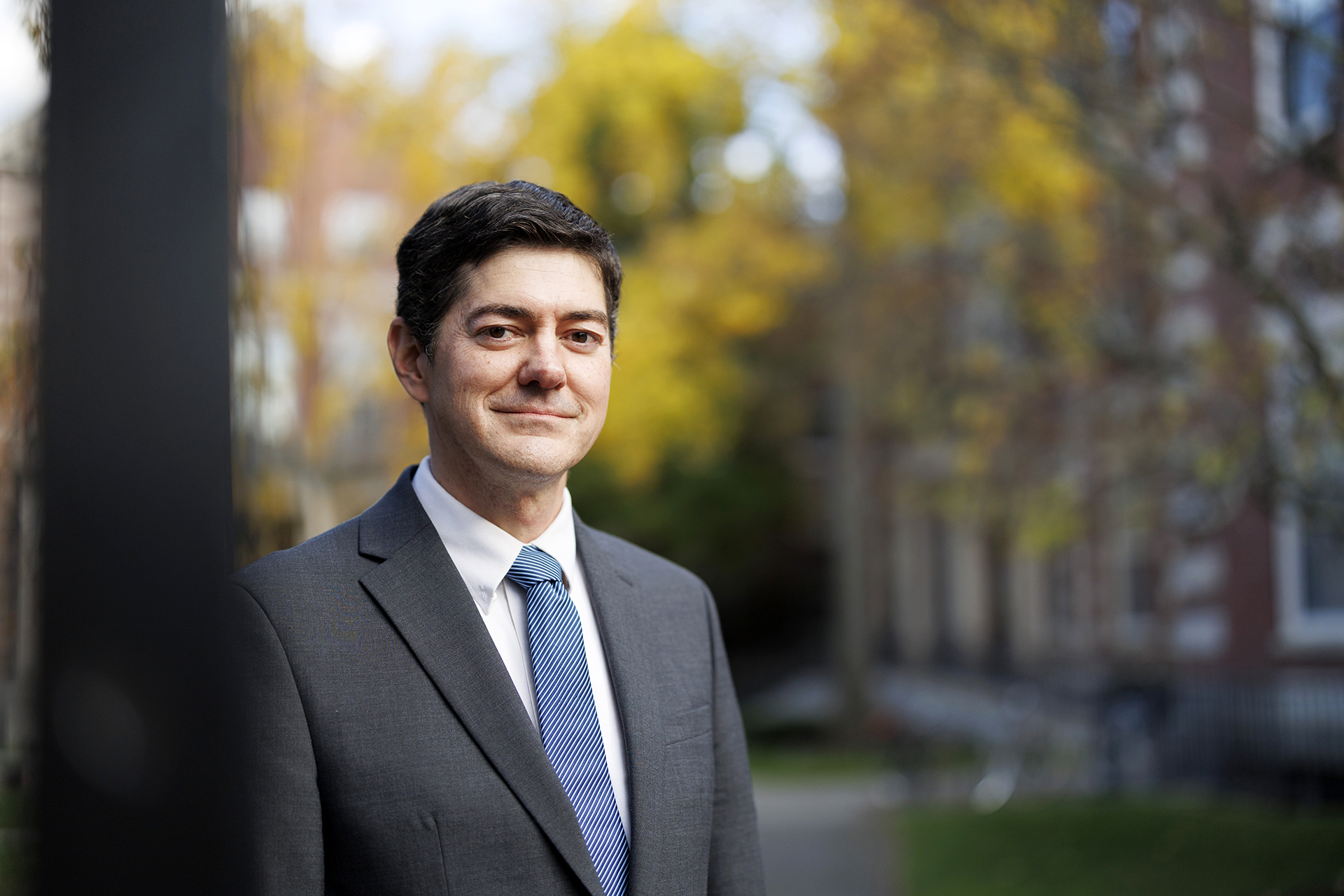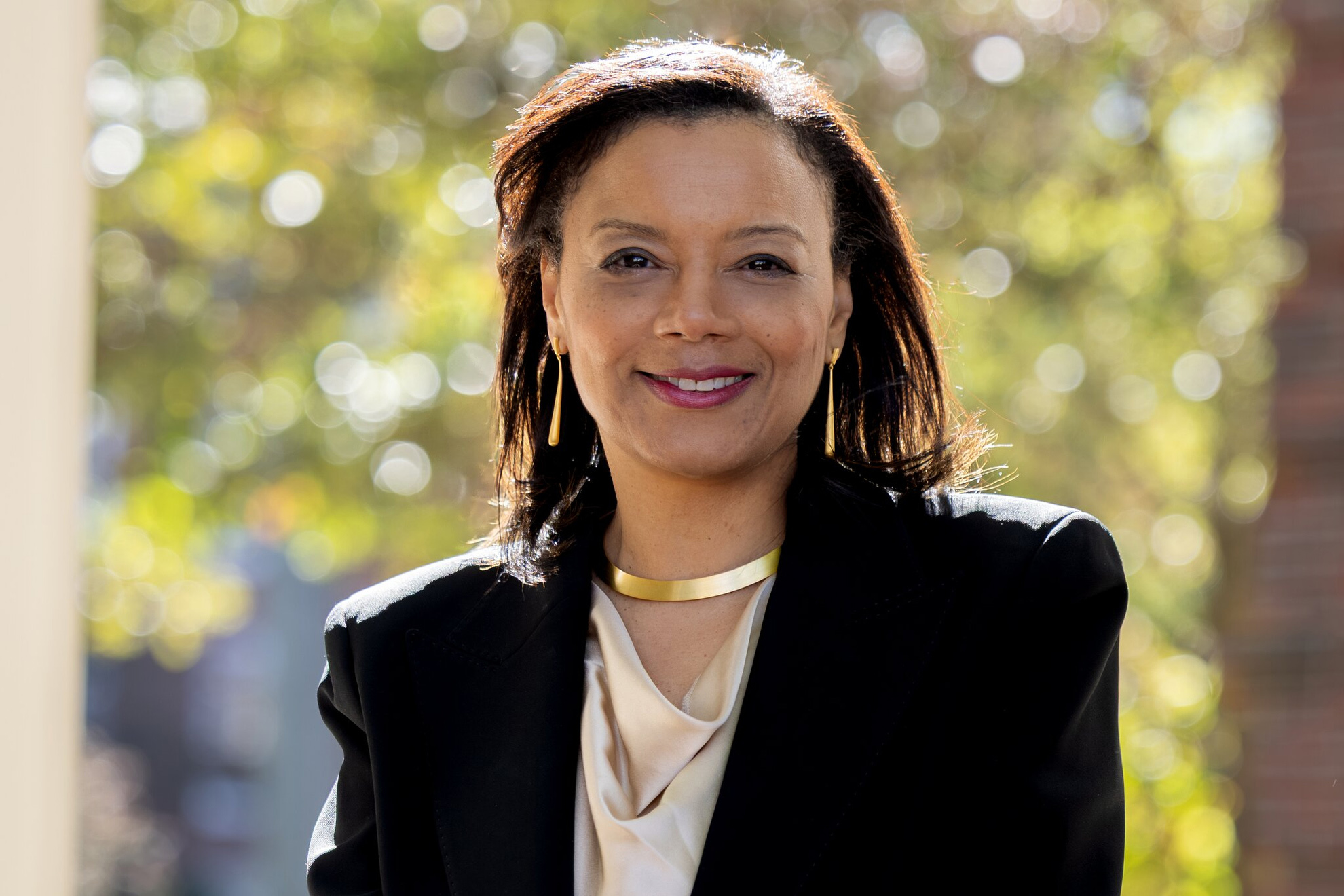Building momentum on open inquiry
Schools implement recommendations to foster more, better conversations on tough topics around campus

Tomiko Brown-Nagin (center) and other scholars discuss intellectual diversity in higher education as part of Radcliffe in the Round, one of several new initiatives that aim to nurture a culture of open inquiry on campus.
Kevin Grady/Harvard Radcliffe Institute
Professor of Government Eric Beerbohm asked a packed Sanders Theatre audience of first-years to debate a provocative question: How do we value our friends who disagree with us?
The question stemmed from a dining hall conversation he had with a student in Quincy House, where he serves as faculty dean, about how to maintain a friendship given a profound divide in political views.
Beerbohm shared the anecdote as part of a larger conversation with first-years during this fall’s Class of 2029 orientation. He went on to detail the Aristotelian, Kantian, and Emersonian views of friendship.
He was impressed watching as students passionately, yet thoughtfully and respectfully, wrestled with various perspectives.
“I was struck by how the students modeled both the intellectual and emotional virtues that make disagreement meaningful,” Beerbohm said. “It was a lively, joyful kind of argument — the kind of exchange that makes a university a university.”

“The ultimate test is that this isn’t a special project anymore. It’s the air we breathe — in classrooms, in Houses, and in the ways we talk and listen to one another,” said Eric Beerbohm, co-chair of Harvard’s Open Inquiry and Constructive Dialogue Working Group.
Stephanie Mitchell/Harvard Staff Photographer
As co-chairs of Harvard’s Open Inquiry and Constructive Dialogue Working Group appointed by President Alan Garber and Provost John Manning in April 2024, Beerbohm and Tomiko Brown-Nagin, Harvard Radcliffe Institute dean, have been working together to promote these kinds of conversations across campus.
The orientation discussion was one of many that have sprung from the working group’s report last year. While the report detailed numerous existing University efforts to encourage dialogue and enliven learning communities, it also examined the degree to which community members felt constrained in their ability to share their views. The report concluded with recommendations to continue to nurture and reinforce a culture of open inquiry.
“When many people talk about the state of our campuses, there tends to be a sense that these problems are intractable and unsolvable,” Brown-Nagin said. “In fact, they are not unsolvable. We can acquire skills that help us engage dissent and disagree more agreeably, and I’m greatly encouraged that so many efforts have been undertaken across campus to do just that.”
Ari Kohn, a senior in Leverett House who co-founded the Intellectual Vitality Student Advisory Board in 2024 and serves as co-chair, said that while widespread cultural change will require organic support from students, she thinks that the University has identified an issue that resonates with students.
“No matter where you fall on the political spectrum,” Kohn said, “I think you’d be hard pressed to find someone who feels like their experience of Harvard wouldn’t be better with more opportunities for authentic dialogue.”
Enabling more candid conversations
The University has taken several steps to create more of these opportunities.
Brown-Nagin highlighted the widespread adoption of the Chatham House rule, which prohibits students from attributing comments to specific classmates outside of the classroom, as one example of how the community has implemented the working group’s recommendations. Since last October, the Faculty of Arts and Sciences, Divinity School, Graduate School of Design, and Medical School have adopted this non-attribution policy, with three other Schools weighing similar changes. The Kennedy School, Business School, and Law School had non-attribution policies before the report was released.
The report’s call to train students to disagree constructively has also been taken up enthusiastically across campus.
“I don’t know if I came into Harvard with all the skills that you need to have College-level discussions about important issues. I hope that the fact that now every House has something like this can really help people.”
Jacqueline Metzger, junior
At the beginning of the school year, first-years now take six modules from social psychologist Jonathan Haidt’s Constructive Dialogue Institute, a nonprofit that helps students communicate across differences and strengthen constructive conversations. The School of Dental Medicine, Medical School, and School of Public Health have instituted orientation programming that highlights these skills as critical to their educational experience and eventual careers in medicine and public health.
On top of its existing training for 1L students, Zero-L, which emphasizes productive disagreement, the Law School added a three-part “cultivating community” series that explores, among other topics, the role of civil discourse in and out of the classroom. Starting with the Class of 2026, every Law School student must take a negotiation class before graduation.
Similar efforts are underway at other Schools to help students practice effective communication on charged topics.
“I’ve heard really great things from my buddies in their first year and sophomore year who found the perspectives module really powerful,” said Kohn, explaining how it gave new students the language to discuss a core academic principle — open inquiry and constructive dialogue — that is sometimes hard to articulate. “Realizing it’s a key ethic of the University was, for many of them, inspiring and has been a North Star in their understanding of what they want out of this experience.”
Quincy House junior Jacqueline Metzger, whose dining hall conversation with Beerbohm helped spur his orientation talk, said she was encouraged by how the Houses have used University guidance and resources to start discussion groups that tease out complex issues.
She said her experience participating in Quincy House’s interfaith group Big Questions helped her find community and a place where she could be comfortable sharing her ideas. Lately, she said, “I think there’s a very clear attempt to shift the culture toward more open conversation and open dialogue.”
The skills students can pick up in these groups, she said, can be invaluable. “I don’t know if I came into Harvard with all the skills that you need to have College-level discussions about important issues,” she said. “I hope that the fact that now every House has something like this can really help people.”
Training the trainers
These initiatives have reached instructors, too.
Within the office of the vice provost for advances in learning, the Harvard Initiative for Learning and Teaching (HILT) has centered constructive dialogue in its efforts to nurture innovative and effective pedagogy.
Shortly before the release of the working group report in fall 2024, Beerbohm and Brown-Nagin kicked off the 2024 HILT conference, which convened students, faculty, and staff from across campus, around the theme “Open Minds in Dialogue.”
In FAS, The Derek Bok Center for Teaching and Learning offers training on how to promote healthy classroom dialogue on divisive topics. The course is now required for teaching fellows in FAS, with the center offering special trainings at different Schools. Brown-Nagin encouraged faculty from across Harvard to explore the center’s resources.

There’s a “tremendous gap between our campus culture and how it is characterized — or even caricatured — by some of our critics,” said co-chair Brown-Nagin.
Photo by Melissa Blackall
Beerbohm stressed the importance of building programs based on the expertise of faculty members across the University. He cited the working group’s collaboration with Julia Minson, the Kennedy School professor of public policy who runs the Constructive Disagreement Lab. The group, he said, is building a research-backed online module that will help students practice productive disagreement and help Schools evaluate improvements over time. Expected to launch in the summer of 2026, the tool will support future orientations and provide refreshers throughout the year.
Beerbohm and Brown-Nagin identified collaborations like this as especially promising developments after the report.
“When we went from School to School, what was most striking was that we had, although somewhat siloed, the world’s leading experts on questions of disagreement and facilitation,” Beerbohm said. “What this project will do is leverage all that research and then create an evidence-backed orientation for new and returning students.”
In addition to building upon faculty expertise, many Schools and centers have built programs related to open inquiry over the years, efforts which have been buoyed since the release of the report. For example, the Constructive Disagreement Lab was built on the foundations of the events and curricular changes associated with the Candid & Constructive Conversations initiative launched in 2022.
Necessary skills across disciplines
Both co-chairs emphasized that their continuing interest in promoting open dialogue on campus reflects their own academic research.
Brown-Nagin, with dual professorship appointments at the Law School and Faculty of Arts and Sciences, said her commitment to open inquiry, academic freedom, and freedom of expression is grounded in her scholarship on constitutional law and the legal history of the American Civil Rights Movement.
“Both demonstrate that in a diverse constitutional democracy, the ability of institutions to evolve — and of individuals to flourish — depends on listening to dissenters, managing conflict among constituencies, and responding to legitimate calls for reform,” she said.
Brown-Nagin noted Harvard Radcliffe Institute’s efforts to make academic freedom and open inquiry key parts of the organization’s mission.
“We’re threading that focus throughout all of our endeavors,” she said, “The point of it is to explore and educate the public about what academic freedom actually means and why it matters, and also to explore the variety of threats to academic freedom and open inquiry in our world today.”
The institute has established an annual lecture on academic freedom, the first of which was delivered by Michael Sandel, Robert M. Bass Professor of Government, about his book “The Tyranny of Merit: Can We Find the Common Good?” Another effort, called Radcliffe in the Round, is a series of roundtable discussions where scholars and other experts across ideologies and disciplines discuss contentious topics like how to increase intellectual diversity in higher education. (The conversations add to the growing number of campus events aimed at promoting and modeling campus discourse, including those through the Law School’s Rappaport Forum, launched in 2020.)
The institute is also providing financial resources for interdisciplinary faculty research related to academic freedom and connecting across difference.
Beerbohm, whose ongoing book project is called “How to Disagree: From Friendship to Politics,” discussed ongoing work at the Edmond & Lily Safra Center for Ethics, which he directs.
The center launched a disagreement lab, which serves as a research hub and design studio. The work coming from this new lab, he said, has been used to create simulations and case studies that are already being used in the training of teaching fellows and in faculty development workshops.
In addition, the center will host an Ethics Center Expo this semester designed to showcase the research and leading measurements across the professional Schools and at FAS. This year, the center announced its third year of the fellowship in values engagement, which trains and supports residential staff to help undergraduate students hold more productive and meaningful conversations.
Continuing to scale constructive dialogue work
Beerbohm points out that just over a year after the working group’s report was released, the scale of the response has been larger than he could have hoped.
“We’ve identified so many leaders in and outside of the classroom who are working on constructive dialogue in some way or another,” he said. “We have this group that is far beyond the initiative.”
While Kohn believes there’s much more room for students to promote robust civil discourse on campus, she said that students have a much better awareness for what has been lacking in their campus experience and have taken much more interest in filling that gap.
“I wouldn’t be involved in this work if I didn’t really believe in it,” she said. “I want to be part of helping to shape it, and I think we’re heading in the right direction.”
Brown-Nagin agreed that there is still plenty of work to be done.
“Culture change takes a long time,” she said. “What I would like to see over a three-to-five-year period is that we’re moving in the right direction. And I think we will see that, because we are all dedicated to this work, and we want to be the best teachers and leaders that we possibly can for our students and colleagues.”
And while there are improvements to be made, Brown-Nagin pointed out that there’s a “tremendous gap between our campus culture and how it is characterized — or even caricatured — by some of our critics.”
“I interact with students in a variety of contexts, whether I’m teaching them or hearing about their ambitions during office hours, or even meeting with them to address concerns. I find them to be smart, reasonable, and fully capable of engaging with different perspectives and managing conflicts.”
Beerbohm hopes that the emphasis on shared norms, repeated practice, and measurable gains creates a “flywheel loop” for openness and humility across campus.
“The ultimate test,” Beerbohm said, “is that this isn’t a special project anymore. It’s the air we breathe — in classrooms, in Houses, and in the ways we talk and listen to one another.”




